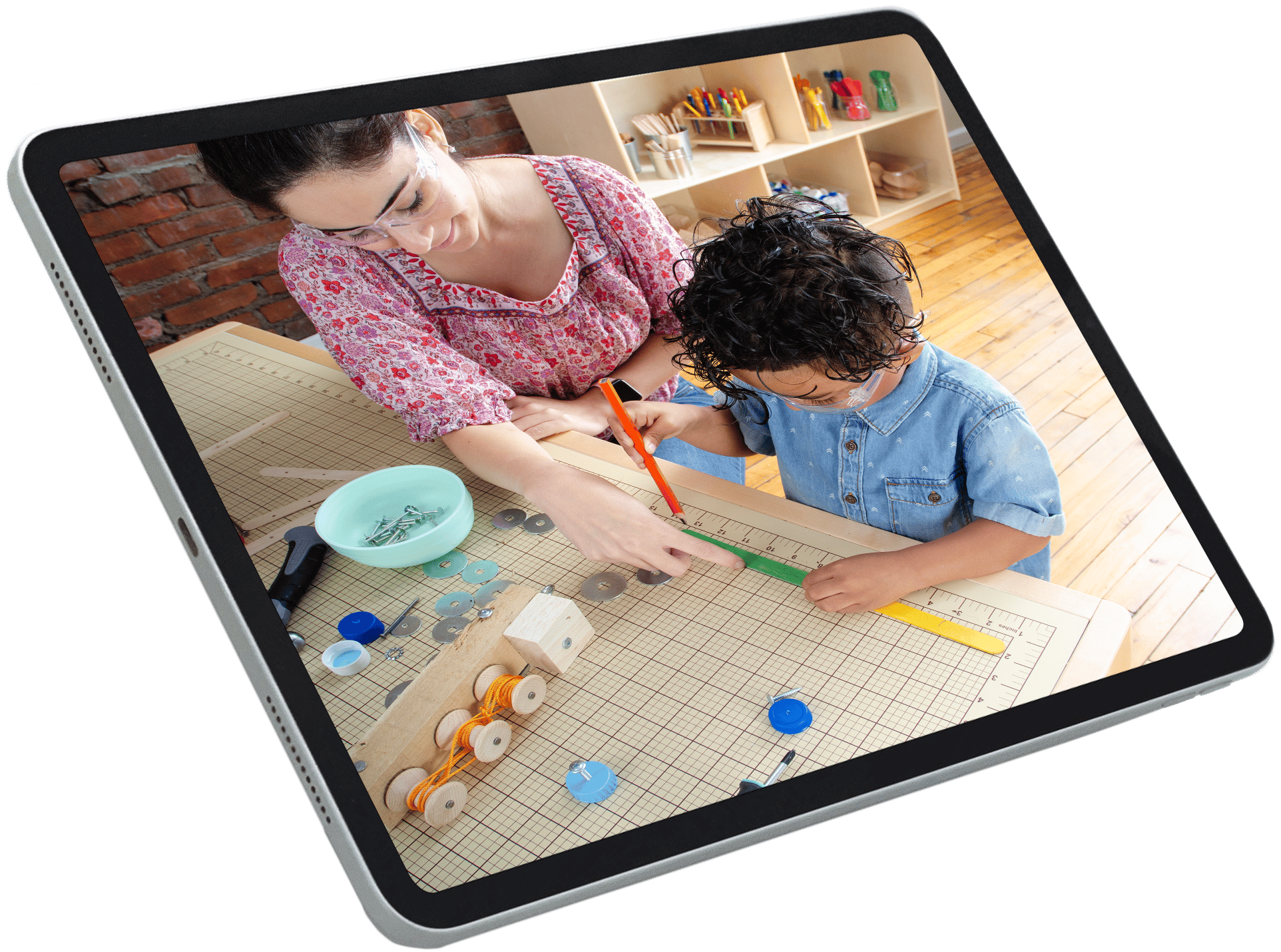
A dramatic play learning center is an essential part of the preschool classroom. Dramatic play helps children explore different roles and situations as children play with items and tools adults use in everyday life. Role play also helps children learn about their community, their surrounding environment, and a variety of careers.
Setting up a dramatic play learning center that's just right for your space and the children in your care can be complicated, but we've come up with a few easy steps that will help you organize a dramatic play center your preschoolers will love:
1. Establish the Size and Location of Your Dramatic Play Center
The first step in setting up your dramatic play learning center is establishing its size and location. The size of the dramatic play area will be dependent on the overall size of the room, how many other learning centers are needed in the space, how many children are in your care, and how many children will be using the center at one time.
The size of your dramatic play center will also be influenced by the themes you want to incorporate in the center. If you want to include more than two or three dramatic play themes, you're going to need a larger space to hold the associated furniture and materials. You should also try to accommodate at least 3-4 children at a time in your dramatic play learning center, but space for two children is acceptable if you're working with a confined space.
Dramatic play centers usually have a loud noise level since role playing and learning to work with others are both major components of dramatic play. Be sure to set up your dramatic play center near other centers that have a loud noise level, such as the block center, music and movement center, nature and science center, or the sand and water center.
For more information about planning the layout of your classroom, check out How to Plan a Great Classroom Layout (Preschool Edition) and our MyKaplan FloorPlanner tool. Both of these are great resources for educators who are looking for a little more assistance in creating a fun and functional layout.
2. Choose the Dramatic Play Themes You Want Included in the Center
Depending on the size of your dramatic play center, you may be able to incorporate several dramatic play themes in the available space or you may only have room for one or two themes. If you have limited space, consider other storage options that will enable you to switch out dramatic play themes throughout the year.
Here are six of the most popular dramatic play themes in preschool classrooms:
- Carpentry
- Dress Up
- Play Kitchen
- Play Living Room
- Play Market/Grocery Store
- Puppets
Choose which themes will best serve the children in your care and then work to incorporate those themes in the space. If you only have room for one or two themes, pick the ones that have the most value and versatility. Both boys and girls would enjoy having a play kitchen or play market in the space, for example, and either of those themes would provide a variety of learning opportunities for children.
3. Select Furniture and Equipment that Complements Those Themes
Once you've finalized the themes for your dramatic play center and have an idea of how much space you have, you can start selecting furniture and equipment that complements your dramatic play themes. A carpentry workshop, play kitchen set, play living room set, play grocery store set, puppet theatre, unbreakable mirror, play mailbox, and dollhouses are a few of the larger furniture pieces you may need for your dramatic play center.
Every dramatic play area should also include a table and chairs for children to use in role play. If the play sets you want for your dramatic play center do not have adequate storage for play props and other materials, shelving units and storage containers can help you keep everything organized.
4. Pick Out Dramatic Play Props and Materials for Your Learning Center
The dramatic play props and materials you choose for your learning center will have the biggest impact on children's role playing and other dramatic play activities. Adding items that promote literacy and math skills, such as writing materials, play money, or a clock, to the center will help children also learn about other relevant topics as they role play. Here are some suggested props and materials for popular dramatic play themes:
Suggested Dramatic Play Props and Materials
Carpentry - A child-size workbench and basic play carpenter tools are needed for this part of your dramatic play center. Be sure to emphasize safety by providing an apron and goggles for each child who plays in the carpentry area.
Dolls and Doll Play Accessories - Multicultural dolls are a great addition to the dramatic play area. Other doll props should include doll clothes, doll strollers, doll cots, and doll inclusion equipment.
Dress-Up Clothes - Children can dress up and learn about a variety of careers, costumes, and cultural customs. Correlate the dress-up clothes available in the dramatic play center with what children are learning about in class.
Housekeeping Play - Housekeeping play helps children practice being an adult and encourages them to clean up after themselves. You should include a variety of cleaning and housekeeping items, such as a vacuum, broom, mop, and ironing board, in your dramatic play center.
Kitchenware and Cooking Play - Provide cooking utensils, table place settings, and a variety of other kitchenware items to go with your dramatic play center's play kitchen set. Children can socialize, practice their math skills, and increase their motor skills as they pretend to cook for each other or have a small pretend dinner party.
Pretend Food - Pretend food can also teach children about nutrition and what children in other countries may eat. Whether they open up a pretend pizza and sandwich shop or pack a pretend picnic, children will love role playing with pretend food.
Puppets and Accessories - Offer a variety of puppets - pets, wild animals, families, sea life animals, dinosaurs, and more - to help children create wonderful stories with their imagination and perform puppet shows for the rest of the class. Try to include a puppet theatre in your dramatic play center to help make puppet shows even more fun and exciting for kids.
Shopping Play - Children can role play realistic shopping experiences with shopping play props and materials. Handbags, wallets, shopping carts, a play cash register, play money, and a variety of supermarket items will help make this part of your dramatic play center a hit with the kids!
No matter which themes and materials you choose to include, your dramatic play learning center is sure to be entertaining and educational for the children in your care. For more dramatic play ideas and additional play props and materials, be sure to check out our Dramatic Play section.
